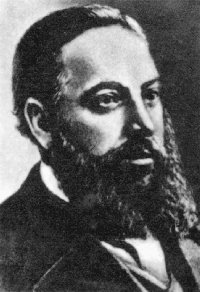Fathers and Sons

When he was only 23 he wrote his best-known poem, "Ukraine Has Not Yet Perished," to become the national anthem of the short-lived Ukrainian People's Republic and later, after being banned for decades, of our own. It was mistakenly attributed to Taras Shevchenko and included in a collection of his verse, in the narodnik (populist) period when The Kobzar was genuinely revered. What better recognition could the author have dreamed of as a cultural inheritor of the national prophet?
Pavlo Chubynsky's greatest accomplishment is a joint fundamental work, the seven-volume and nine-book Works of the Ethnographic-Statistical Expedition to the Western Ruthenian Territories, which is still regarded a handbook for ethnologists. In fact, it laid the foundations of Ukrainian ethnology. Academician Oleksandr Veselovsky thought it one of the top three folk-ethnographic studies of all times and peoples.
Yet the kudos (the gold medals of the Russian Geographical Society and International Congress of Paris, even the most prestigious award of the Academy of Sciences of St. Petersburg) did no save Pavlo Chubynsky, then Secretary of the South-Western Branch of Russian Geographical Society, from the Russian tsar's ill-famed anti-Ukrainian Ems Ukase of 1876 banning Ukrainian language publishing and the same was true of other prominent figures of the period (whom I personally favor, with their dictionary-making, folkfests, and Christmas trick-or-treat rites).
Mikhail Yuzefovich, Privy Counselor and secret informer of the Russian secret police, branded Chubynsky and Mykhailo Drahomanov, future ОmigrО, in his "patriotic" memorandum "Apropos the So-Called Ukrainophile Movement" as "the most inveterate enemies" of imperial integrity, calling the former a "charlatan and zealous agitator." Remarkably, fifteen years earlier, when first purged by the Russian authorities and exiled to the North, Pavlo Chubynsky "agitated" and "Ukrainized" the special messenger accompanying him to his place of exile. Well, there is the new broom rule. Now the scholar was sent into "honorable exile" as a government official with a new assignment. These two models of sending north all those "Mazepa exponents" would be extensively applied by top-level bureaucrats of the next century.
His modernist followers, among them Lesia Ukrainka and Les Kurbas, discarded the "pure Ukrainian Cossack" ideals of the narodniks at the turn of the century, seeking instead a "return to Europe and our own identity," bringing back the nation's "brain, the intelligentsia." (One could draw parallels with today's "culture wars" as represented by Anthony Smith, postmodern formulas like Umberto Eco's "ironic return to oneself," or neomodernistic doctrines like the "return of demiurges.")
While opposing "conservation" of the old national-cultural identity, the new creative generations proposed Europeanization and cosmopolitanism. In other words, they were for modernizing Ukrainian culture, introducing creative innovations based on "other" methods of creative thinking and speaking.
As for Chubynsky with his enthusiasm, he wanted to preserve the lower massif of the nation's cultural wealth; he wanted to introduce what Simone Weil would identify as a denationalized city, acting as a liaison between the past, present, and future of his nation, becoming a symbolic figure in the history of Ukrainian society. Alas, all that wealth of thousands of Ukrainian folk songs, tales, wedding rites, proverbs, tales, legends, and puzzles Pavlo Chubynsky committed to paper would be never reappear in print after 1878 (not counting two booklets as a pale sequestered shadow of the prominent scholar's multivolume creative legacy).
All this notwithstanding, Chubynsky's folklorist-ethnologist followers,
currently working for peanuts at an Academy of Sciences institute (still
to be paid wages dating from three years), continue to sing "Ukraine Has
Not Yet Perished", keeping in the same romantic vein, although the anthem's
starting line is regarded with a tangible degree of pragmatic irony by
all those postmodern professionals hung over from countless presentations
and attendant verbiage.
Newspaper output №:
№4, (1999)Section
Culture





